 |
'Witness' protection program for accelerator cavities: ISRFST group studies ways to improve performance |
 |
Christoph Leemann's Holiday Season message to the Lab community |
 |
DOE requires more stringent oversight, management of equipment, materials |
 |
Be wary of holiday eCard scams, cyber attacks |
 |
Jefferson Lab completes DOE cyber security staff assistance visit |
 |
Determining JLab work status during, after severe weather |
 |
Tips for being safe when winter weather arrives |
 |
Science - Powered by the Imagination: JLab volunteers sought to help with Virginia high school and middle school 2007 Science Bowl tournaments |
 |
Jefferson Lab's Spring 2007 Science Series features two lectures in February |
 |
BEAMS seeks volunteers, helpers for spring 2007 classes |
 |
Time to update federal, state tax withholdings if you have exemption changes |
 |
End-of-year TLD badge change out nears |
 |
Milestones for December 2006 |
 |
Department of Energy awards contract for management and operation of Fermi National Accelerator Laboratory to the Fermi Research Alliance, LLC |
'Witness' protection program for accelerator cavities: ISRFST group studies ways to improve performance (top ^)
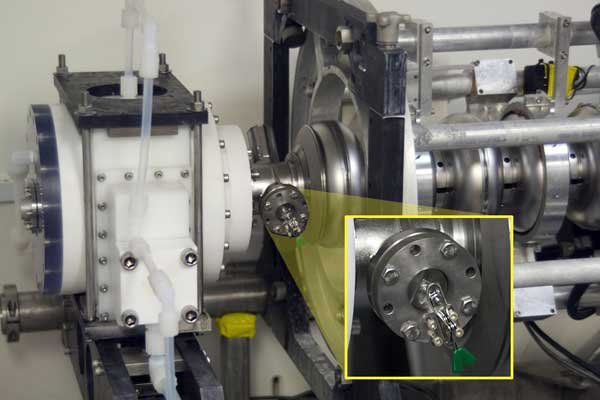
The green-tipped pin in the picture is attached to a "witness sample." This quarter-sized slice of niobium is identical to the niobium in the ILC (International Linear Collider) cavity onto which it is mounted. The sample is situated on the cavity's fundamental power coupler, where radio frequency waves will later be fed into the cavity for accelerating particles.
John Mammosser, a senior engineer in the Institute for Superconducting Radio Frequency Science and Technology (ISRFST), says the witness sample will undergo the same cleaning processes (including electropolishing) as the cavity. After the procedure, it will be removed from the cavity and analyzed extensively, including a test of its field emission characteristics in the scanning field emission microscope. The witness sample allows extensive testing of a representative niobium surface that has been prepared by the same processes as the cavity, without risking damage to the cavity.
The witness sample project is a part of the Jefferson Lab ISRFST's program to increase the efficiency and quality of superconducting radio frequency accelerator cavity production. In addition to being a crucial part of the quality-control measures in ILC cavity processing and testing, lessons learned from the witness sample project may also prove useful in improving performance in cavities produced for Jefferson Lab's 12 GeV Upgrade project.
Dear Colleagues, (top ^)
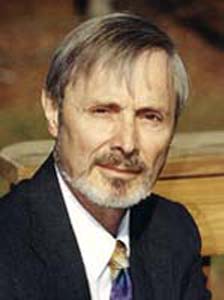
Christoph Leemann, Jefferson Lab Director
The holiday season and the beginning of a new year provides a natural opportunity to reflect on our accomplishments of the past year and to look ahead to the year to come. This year has been incredibly challenging for Jefferson Lab and all of us who work to deliver its scientific and technological programs. It has also been a year of new opportunities and great achievement thanks to the efforts that each of you put forth to make the Lab and its programs a success. (top ^)
Look at what we have accomplished just this year – we have completed several experiments including several large-installation and high-profile experiments with demanding beam requirements. Twenty-six students have received Ph.D.s this year based on research conducted here and another 138 are in progress. The Free-Electron Laser recently delivered 14.2 kW of infrared laser light and has completed several exciting experiments with Terahertz and infrared light. We continue to make strides in strengthening our safety culture and in translating that into safety performance. The contract for the management and operation of Jefferson Lab was awarded to Jefferson Science Associates, concluding an effort that involved a number of senior management and support personnel. The 12 GeV Upgrade project completed several successful reviews, received CD-1 approval from the Department of Energy early in the year and is well on its way to the next critical milestone toward construction. Our cryogenics group has instituted a new process its members developed at the Central Helium Liquefier that is saving the Lab money on electricity and is reducing utility costs at several other scientific research facilities. Our new upgraded Internet connection provides data transfer rates that are up to 60 times faster than before. We have expanded our teacher program to provide support during the school year to local teachers in math and science, positively impacting the instruction of hundreds of children.
These are just some of the accomplishments that have been made possible by the hard work and dedication that you have shown over the past year. Whether you are a world-renowned physicist, an accelerator operator, a safety professional, an administrative assistant, a technician or one of the many other professions and trades here at Jefferson Lab, your contributions have been essential to making these successes possible.
I would ask that all of us be mindful, as you prepare for the holidays at work and at home, of proceeding thoughtfully and safely with your daily activities and that you take advantage of the shutdown to relax, enjoy, and return to work for the coming year refreshed and renewed.
I want to wish each and every one of you, your families and loved ones happy and healthy holidays filled with all the joys of the season and a safe and prosperous New Year!
Best wishes,
Christoph W. Leemann
DOE requires more stringent oversight, management of equipment, materials (top ^)
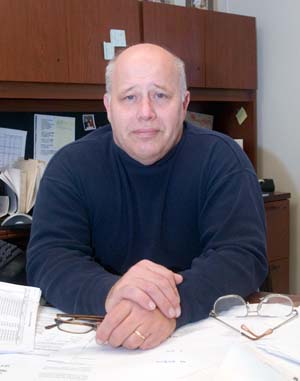
Tom Briggs, Property Manager
Due to recent property management concerns at several labs including Jefferson Lab the Department of Energy is looking for the Lab to strengthen the oversight and management of government-purchased equipment and materials. At JLab, these changes will impact oversight and management of a broad range of equipment and materials, starting with the initial ordering process and continuing through to end use or disposal.
Tom Briggs, JLab’s Property Manager, recently ran down an extensive list of changes that have been made or are in the process of being made to Jefferson Lab’s Property Management program. Significant changes have been written into the latest version of the JLab Property Management Policy and Procedures (dated Sept. 28, 2006) and additional changes are expected to be added to the document during 2007. Briggs strongly urges every Property Custodian – whether you are responsible for 2 items or 200 items – to spend some time reviewing the Property policy and procedure and the features and information available on the Property Office web page. Some of these changes are discussed below.
“The days of an individual custodian using a government ‘P’ credit card to make some types of purchases have ended,” he notes. All administratively controlled items, equipment, and sensitive items must now be bought via a Purchase Requisition through Procurement, or through JLab’s Intranet Commerce or the Stockroom. The Lab has assigned Commodity Managers, an additional management level beyond normal approval levels, to approve the purchase of the following materials and types of equipment.
---Audiovisual and Conferencing Equipment
---Bikes and Helmets
---Books
---Chemicals
---Computers
---Deuterium Gas
---Furniture
---Hand and Power Tools
---Hypodermic Needles, Syringes
---Lasers
---Lead and Precious Metals
---Material Handling Equipment
---Potable Alcohol
---Vehicles and Motor Equipment
---Radiological Sealed Sources
According to Briggs, this will allow the Lab to better manage resources in these areas, ensure a systematic application of safety requirements, and control budget.
No longer will two separate work groups be able to split the cost for an equipment purchase. An equipment purchase can only be made using one account code. If two work groups want to buy a piece of equipment, one of the groups will need to transfer its share of the funding to the other group to purchase the item.
All equipment and tools – existing items and new purchases – must be marked “DOE” or “Property of DOE.” Briggs is contacting vendors to see if the vendors can mark new purchases before they are delivered to JLab. “If you have equipment that was purchased with DOE money and it needs to be tagged, contact me,” he says. Briggs is making his way around the site looking for items needing to be tagged.
During January 2007, all JLab Property Custodians will be required to complete an annual validation on all sensitive items and equipment valued at $5000 (or greater) assigned to them. Also over the next several months, Briggs will be identifying underutilized tools and specialized equipment, from across the Lab. He is in the process of setting up a Tool Crib for tools and specialized equipment that may be shared or used across the broader JLab community. He sees the Tool Crib as making available things like concrete mixers, power washers, and tool kits. JLab staff and users will be able to sign out items in the Tool Crib to carry out their work at JLab. He is working with Procurement to expand the FreeStock concept with commodities such as wiring and metal, that are at JLab but do not have a current planned use. “We encourage the use of what we already have on hand prior to purchasing additional material,” Briggs comments. “This is important particularly in the current continuing resolution budget situation.”
Tom’s Guidelines for Better Property Management
---Keep track of your property.
---Don’t sign for equipment or materials you haven’t seen or don’t know where it is.
---Make sure all equipment is tagged or marked appropriately. (Make sure anything personally owned is marked with your name.)
---If you make a new piece of equipment, contact the Property Office to get it tagged or marked appropriately.
---If you have visitors or users bringing their own equipment on campus, it must be appropriately marked. The Property Office can provide property tags for visitor/user equipment and materials.
---Don’t take government property off campus without the appropriate Property Office paperwork (except exempt items like laptop computers and PDAs which are meant to be mobile).
---Don’t leave government property sit in your personal vehicle, or anywhere that it could be stolen.
---If you think something has been stolen, notify JLab Facility Security Officer Kris Burrows, ext. 7548, or email burrows@jlab.org.
---If you discover something is missing, notify JLab Property Manager Tom Briggs, ext. 5430, or email tbriggs@jlab.org.
---If you are sending something off campus for repairs, first notify the Property Office, then send it off campus through Shipping and Receiving.
---If you are loaning a piece of equipment to another lab or institution, first do the appropriate paperwork through the Property Office.
---Don’t throw old or broken equipment or materials away. Contact the Property Office to determine the appropriate way to dispose of all equipment and unused or leftover materials.
---Anything that could be perceived as “scrap” material must be turned in to the Property Office.
---Don’t cannibalize equipment unless you first get the Property Office’s OK.
---Don’t trade materials or equipment with other work sections. Turn the stuff in and have the other work section get the stuff assigned to it through the Property Office.
---Currently DOE prohibits allowing anyone outside of JLab’s Computer Center to access your hard drive, this includes for repair or replacement. Always contact the Computer Center if your computer isn’t functioning properly.
---If you have a non-functioning hard drive coming out of a computer, it MUST be turned in to the Stockroom Counter (Bldg. 90) for proper disposal. (This is a DOE requirement.)
Be wary of holiday eCard scams, cyber attacks (top ^)
by David Bianco, JLab Cybersecurity Analyst
Information Technology (IT) Division
The holidays are here again, and with them come the yearly flood of electronic greeting card scams. As popular as eCards are with your brother Phil and your Aunt Lucy, they're even more popular with Internet fraudsters.

David Bianco, Cybersecurity Analyst
This year more than ever, the eCard you receive “might” be legit, or it “might” be an attempt to trick you into giving an attacker access to the information on your PC. The e-thieves' biggest targets are credit card numbers, bank account details and other information that could help them steal both your identity and your money. Worse, the eCards themselves can appear to come from legitimate sites or to have been sent by your actual friends and relatives. Telling the legitimate eCards apart from the scams can be very difficult, and guessing incorrectly can cause real problems.
So what can you do to help protect yourself (and the Lab) from this type of attack? The most effective thing is simply to avoid viewing the eCard, at least until you have verified that it was sent by someone you know. If you receive an email asking you to “click here to pick up your eCard”, don't do it. If you do not recognize the sender's address, simply delete the email. It's almost certainly a scam. If you do recognize the sender, send them an email and ask if they really did send the eCard. If so, it's probably safe to read the
eCard. If they tell you that they did not send the card, simply delete the message and bask in the knowledge that you've helped maintain the Lab's cybersecurity and protected your personal information.
If you'd like to do some additional reading on the subject, here are a few good URLs to start with:
http://www.ecommercetimes.com/story/53889.html?u=TimCallan&p=ENNSS_c7f60b4994fd44c4fc5cdb1e404b6e6e
http://www.k-state.edu/infotech/security/topics/greetingcards.html
http://www.enterpriseitplanet.com/security/features/article.php/3645616
Jefferson Lab completes DOE cyber security staff assistance visit (top ^)
A Department of Energy Site Assistance Visit (SAV) for cyber security was held at JLab September 18-21. A team of DOE cyber security experts has been visiting every DOE laboratory to assess cyber security programs and documentation and to help the labs meet the ever-changing threats that the facilities face. While here, the team reviewed documentation, heard presentations, and discussed current policies and practices with managers responsible for cyber security throughout the Lab. A technical team also assessed JLab’s cyber security systems and suggestions were made to enhance protection and decrease vulnerability to changing cyber security threats.
Over the past several months, Chief Information Officer (CIO) Roy Whitney and the Information Technology (IT) Division have been working to increase awareness of cyber security threats and to enhance processes and controls for the protection of the Lab’s IT systems. The Information Technology Division (ITD) will continue to inform JLab staff and users as these threats change and new ones emerge. In addition, ITD is coordinating with the DOE Office of Science cyber security program and other DOE labs to be sure that JLab's program has the best in class solutions and systems for cyber security that support achieving the Lab's science and technology mission.
Determining JLab work status during, after severe weather (top ^)
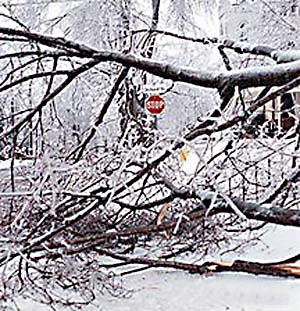
If there is a delayed opening or JLab closure due to severe winter weather, there are three primary ways for staff, users and subcontractors to get current information on JLab’s operating schedule. For updated, recorded messages, call the main telephone number, (757) 269-7100, which can handle up to 16 calls simultaneously; or call the JLab Status Line, (757) 232-2000, which can receive up to 20 calls at a time. You may also visit the JLab website (www.jlab.org/) where weather closing or delay information will be given as a banner message. JLab closing or delay information is also given to the three local network TV stations (WTKR ch. 3 (CBS), WAVY ch. 10 (NBC) and WVEC ch. 13 (ABC), and several local radio stations; but JLab cannot guarantee that the information will be posted or reported accurately.
If after checking these sources, you are still uncertain about going to work, call your supervisor. If your supervisor has specifically informed you that you are designated as “essential personnel” for a weather-related event, be alert for special instructions that affect you. All others – employees, users and subcontractors – are subject to closure status instructions and cannot return to JLab before the time specified. JLab’s security service is under instructions to advise all but designated essential staff that the Lab is closed.
The Lab’s procedures for winter storms are posted in the EH&S Manual, Appendix 3510-T4 under the heading “Winter Storms.” Additional severe weather information is located at http://www.jlab.org/intralab/emergency/hurricane/severe.html along with suggestions for walking safely in icy conditions.
The Lab’s Administrative Manual (section 207.08.D.2) contains the policy regarding taking leave due to a weather emergency. One paragraph in the section says: “Employees, who, on their own, decide that weather conditions preclude their attendance or requires their early departure, may take vacation leave provided they obtain the advance approval of their supervisor.”
If weather conditions deteriorate during normal work hours and the decision is made to close the Lab, a Site Wide Alert notice will go out over JLab email and pagers and the early closing will be posted to the JLab InSight Front Page.
Tips for being safe when winter weather arrives (top ^)
Falls and slips can lead to serious injury. Exercise the appropriate care and attention to avoid accidents during and after winter weather. The Lab will do its part to keep the site safe.
Should the Lab have a delayed opening due to ice or snow, do not arrive prior to the designated start time, as additional traffic hampers the clearing of roads and parking lots.
JLab Snow Removal
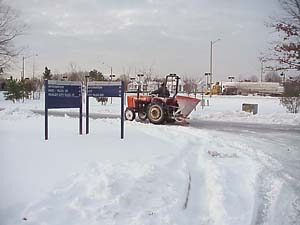
Snow-removal procedures place priority on clearing the entrances most directly connected by pavement to the parking areas. For some buildings, this may not be the most frequently used entrance. Additional entrances will be cleared when all priority routes have been treated. Employees need to use the cleared paths even if it is not their usual route.
Facilities Management has placed buckets of sand at many of the buildings for tenants to use as “self-service” to spread on ice while awaiting thorough removal. We ask that these buckets not be used for cigarette butts. For more information, refer to the Snow Removal Plan on the Emergency Management Severe Weather page. http://www.jlab.org/fm/snow_removal.pdf
Please remember that we are all personally responsible to take necessary precautions and to pay attention to the hazards created by these weather conditions. Employees are urged to report unsafe conditions by calling extension 7400.
Avoiding Slips and Falls in Winter Snow and Ice
A rash of slips and falls usually accompanies the winter months. Nearly two-thirds of these mishaps occur on snow, ice, or wet surfaces near entrances or on parking lots. Here are some tips to help you prevent falls:
-- Wear shoes or boots that provide good traction. Rough or rippled pattern rubber soles are generally best. Smooth leather is the least desirable. Lugged rubber patterns fall in between. Slipover grip accessories are very effective on icy surfaces.
-- Give yourself plenty of time. Take short steps with your feet pointed slightly outward. This will help keep your center of balance under you and provide a stable base for support.
-- Be extremely careful getting out of your vehicle. If possible, swing your legs around and place both feet on the pavement before you attempt to stand. Steady yourself on the doorframe until you have gained your balance and have firm footing. Avoid reaching beyond your center of balance to take hold of the door, as this may cause a fall.
-- Don't take shortcuts. Always use sidewalks and the cleared, designated paths in parking lots. Never walk between parked cars; there may be untreated ice and snow. Be especially careful when stepping to different levels – down or up steps or from curbs. Don't step on curbs. And remember, grassy slopes can be as dangerous as snowy steps.
-- Pay attention to the walking surface; it may be significantly slicker in spots. When walking after sunset or in shaded areas, be alert for black ice – a thin, almost invisible ice film. It can form from melted snow and ice water refreezing overnight. It also can occur when above-freezing air contacts frozen ground surfaces.
-- Carry only those items necessary. Carrying heavy or bulky packages affects your balance and center of gravity.
Science - Powered by the Imagination: JLab volunteers sought to help with Virginia high school and middle school 2007 Science Bowl® tournaments (top ^)
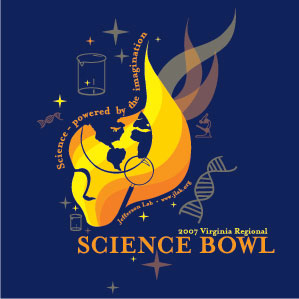
The 2007 Science Bowl® season is just around the corner, announces Jan Tyler, JLab’s Science Education manager. As in the last few years, JLab will host two Science Bowls early in ‘07: the Virginia Regional High School Science Bowl on Saturday, February 10, and the Virginia Regional Middle School Science Bowl on Saturday, March 10.
Dozens of volunteers – JLab employees, users, family members and students – will be needed to help with these events, according to Tyler. “We need you, your co-workers, spouses and children (over age 13) to volunteer for the many activities required to conduct these academic competitions. There are plenty of duties to go around,” Tyler adds. “If you’ve enjoyed helping out with prior Science Bowls, or if you’ve never been to a Science Bowl, but want to be part of the excitement, we want you!”
The Science Bowl is a highly visible, annual educational event and academic competition among teams of students. The theme for this year’s series of tournaments, which will take place at regional events across the nation and wind up with the national competition in Washington, D.C., is Science - Powered by the Imagination. “These events champion an interest in science and math across the nation,” Tyler explains. “This year we have 24 teams signed up to compete in the Feb. 10 high-school event, including five teams competing for the first time: Phoebus High School, Douglas Freeman High School, King and Queen Central High School, New Kent High School, and West Point High School.”
More than 70 volunteers will be needed to run the daylong Feb. 10 competition. Most of the public areas and conference rooms of CEBAF Center will be taken over that day by the more than 200 high school students, their families and coaches, and the dozens of volunteers that will gather for the event. The morning will consist of a round-robin competition, followed by double-elimination rounds in the afternoon. “By 5 p.m. we’ll be ready to name the winner,” Tyler says. The top three teams will earn cash prizes for their respective schools, and the top team wins an expenses-paid trip to the Science Bowl Nationals held in Washington, D.C., April 26–30.
“We’re excited to be hosting these events. They are a great way to promote education, academic excellence and an interest in math and science,” Tyler points out. “Competing with their peers is a great confidence builder and a fantastic way to motivate young minds.” The Science Bowl, which is celebrating its 17th year of Department of Energy sponsorship, is an academic competition among teams of students who answer multiple-choice and short-answer questions on a variety of scientific topics (chemistry, biology, physics, mathematics, astronomy, and the general, earth and computer sciences). Each team is made up of five students, and a teacher who serves as advisor and coach.
Most of the volunteers needed to support the tournament will perform as competition moderators, rules judges, timekeepers and scorekeepers during the morning, round-robin sessions, according to Tyler. She’ll also need a small number of volunteers to be the on-site scientific team that is called when a student challenges a question or answer during the competition, and a few individuals to help with administrative tasks and to assist with the alternative afternoon activities planned for the teams that fall out of the competition during the morning session.
Science - Powered by the Imagination
Science Bowl
Volunteer Training Sessions
Wednesday, Jan. 31, 2007, from 1 - 2 p.m.
Friday, Feb. 2, 2007, from 9 - 10 a.m.
Practice Session
Thursday, Feb. 8, 2007, from 9-11a.m.
All training sessions will be held in the VARC (Bldg 28), classrooms 72 A and B.
The moderators, rules judges, timekeepers and scorekeepers each have specific roles during the competition. Descriptions of each position’s responsibilities have been posted on the Science Education web page at http://education.jlab.org/sciencebowl/.
All participants and volunteers will receive a “Science - Powered by the Imagination” T-shirt. Volunteer shifts will run from 9 a.m.-1 p.m. and from 1-5 p.m. with more people needed for the morning shift. “This is strictly a volunteer activity,” Tyler reminds aspiring helpers. Anyone interested in more information or in volunteering for the Feb. 10 event may contact Tyler, email tyler@jlab.org or call ext. 7164.
Currently, 18 teams are registered for the Mar. 10 Middle School Science Bowl. “This means we anticipate needing 45 volunteers to support the second Science Bowl event,” Tyler notes.
Jefferson Lab’s Spring 2007 Science Series features two lectures in February (top ^)
Jefferson Lab will host two Spring Science Series lectures during February 2007. The first event is set for Tuesday, February 20, and will feature David Powars, with the U.S. Geological Survey (USGS), discussing the Chesapeake Bay Impact Crater. He will share with the audience, recent research from a core hole more than a mile deep in the central zone of this 35.5-million-year-old impact crater buried beneath the lower Chesapeake Bay and how it is still affecting the region today.
Then prepare for the thrill of competition – mental competition – on Wednesday, February 28, when Dr. Richard Berg, with the University of Maryland Physics Department, conducts The Physics IQ Test for the audience’s enlightenment and entertainment. The audience will vote on the outcome of physics brainteaser-type questions, which will then be answered by Berg as he performs demonstrations or experiments that will answer the questions.
Each presentation begins at 7 p.m. in Jefferson Lab’s CEBAF Center auditorium, located at 12000 Jefferson Ave., Newport News, Va. The programs are free and open to anyone interested in learning more about science; they last about one hour and include a question and answer period at the end. For security purposes during Science Series events, enter at Jefferson Lab’s main entrance (Onnes Dr.). Everyone over 16 is asked to carry a photo ID. Security guards may perform ID, backpack, purse and vehicle checks. For more information, visit http://education.jlab.org/scienceseries/currentseries.html.
Individuals interested in receiving emails about upcoming, public Science Education events at JLab may subscribe to this service through the Jefferson Lab Education Events Mailing List. Call 269-5102 for more information.
BEAMS seeks volunteers, helpers for spring 2007 classes (top ^)
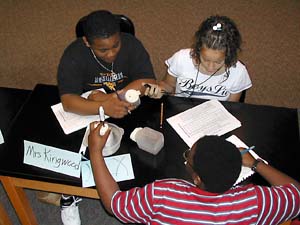
BEAMS students carry out the Cold Stuff experiment during their visit to JLab.
BEAMS – Becoming Enthusiastic About Math and Science – the Lab’s long-running, math and science enrichment program for middle school students will start back up on Jan. 16, 2007. JLab volunteers are critical to the success of this program, according to Stacy DeVeau, Science Education.
The Science Education staff is seeking volunteers (activity leaders and helpers) to assist in the BEAMS classrooms (VARC 72A & 72B) with planned activities for the students. Activities and experiments the visiting students will conduct this spring include the Scale of the Solar System, Insulators, Potential and Kinetic Energy, Energy Reflection and Absorption, UV Radiation, Weather Instruments, and Hurricane Tracking.
Individuals interested in assisting – staff, users and students – may contact DeVeau, ext. 7560, or email stacy@jlab.org for more information about becoming a BEAMS volunteer. Interested individuals with no BEAMS experience may contact DeVeau to observe a class in order to gain a better grasp of the volunteers’ responsibilities.
The program is a great way to help youngsters learn the importance and applications of mathematics and scientific principles, according to DeVeau. The interactive activities and experiments are geared toward Virginia Standards of Learning (SOL) requirements.
Time to update federal, state tax withholdings if you have exemption changes (top ^)
If you have had a life change – marriage, divorce, birth of a child, loss of a dependent, or change in exempt status – since you last filed a Form W-4, Employee’s Withholding Allowance Certificate, you may want to file an amended Form W-4 with JLab’s Payroll Department.
Additionally, those employees who claimed “exempt” from withholding for 2006 must complete a new Form W-4 by Feb. 15, 2007, to keep their “exempt” status.
Using the JLab Human Resource Intranet page, employees can view their current withholding exemptions and make any necessary changes through the Employee Self Service System (ESS) without having to print and/or complete a W-4 or VA-4 form. These changes go directly to our payroll system, notes Payroll Supervisor, Janet Smith.
For those employees who wish to complete paper forms, blank Federal W-4 and State VA-4 withholding/exemption forms are available in the trays outside Room 18 in the VARC. They are also electronically available on the Internal Revenue Service (IRS) and Virginia Department of Taxation websites. The Commonwealth of Virginia VA-4 Personal Exemption Worksheet is available at www.tax.virginia.gov/web_pdfs/busForms/va4.pdf .
Contact Sharon Hay, ext. 7620, or Janet Smith, ext. 7503, if you have any questions.
End-of-year TLD badge change out nears (top ^)
The end-of-year TLD (thermoluminescent dosimeter) badge change out will occur over the holiday shutdown period. Radiation Control staff asks that everyone with a JLab TLD – staff, users, students and contractors – be sure to put his or her badge in its assigned place in the badge racks before leaving for the holiday break. The last day of regular work before the shutdown will be Friday, Dec. 22, 2006. If you are leaving the Lab before Dec. 22, please put your badge in the rack before leaving. Contact Becky Mosbrucker, RadCon, at ext. 7236 if you have any questions.
Milestones for December 2006 (top ^)
Hello
Elke Aschenauer, Hall D Group Leader, 12 GeV Upgrade – Director’s Office
Jessica Carucci, Vacuum/Cryogenic Technician, Physics Division
Robert Doane; QA/QA Lead Assessment Specialist; Environment, Safety, Health and Quality Division
Brian Freeman, Accelerator Operator, Accelerator Division
Megan Ivory, Student Intern (term), Accelerator Division
Cary Kravets, Student Intern (term), Free-Electron Laser Division
Daniel Moore, Database Programmer, Information Technology Division
Katherine Phillips, Student Intern, Physics Division
Marc Schlegel, Post Doctoral Fellow, Theory & Computer Physics
Cameron Sorlie, Student Intern (term), Free-Electron Laser Division
Goodbye
Cliff Burden, Accelerator Technician – SRF, Accelerator Division (Nov. 30, 2006)
Steven Pierson, Accelerator Operator, Accelerator Division (Dec. 21, 2006)
Ivy Thomas, Administrative Assistant, Administration (Jan. 2, 2007)
These Milestone entries, listed alphabetically, are actions posted by Human Resources from the end of November through December 2006.
Posted JLab Career Opportunities
There are currently many full time, term, temporary and doctoral fellow job positions listed on the JLab Career Opportunities webpage at http://www1.jlab.org/mis/jobline/The positions include a range of activities in the Physics and Accelerator Divisions, the 12 GeV Upgrade program, and a variety of support and administration openings.
Department of Energy awards contract for management and operation of Fermi National Accelerator Laboratory to the Fermi Research Alliance, LLC (top ^)
In early November, the U.S. Department of Energy (DOE) awarded a new $1.575 billion, five-year contract for management and operation of Fermi National Accelerator Laboratory (FNAL) to the Fermi Research Alliance, LLC (FRA), owned jointly by the University of Chicago (UChicago) and Universities Research Association, Inc. (URA).
“The quality of the new contract is a direct consequence of the competition process,” DOE Under Secretary for Science Dr. Raymond L. Orbach said during a ceremony at Fermilab where he made the new contract announcement. “The partnership between UChicago and URA will enhance organizational depth and capability, promising improvements in performance and accountability.”
As a new independent entity, FRA was supported in its proposal by the University of Illinois at Urbana-Champaign, Northwestern University, Northern Illinois University and the Illinois Institute of Technology.
UChicago and URA bring a combined 100 years of experience in the management and oversight of DOE laboratories which, when combined with the contributions of Illinois’ leading research universities, will provide a strong foundation for continued U.S. leadership in high-energy physics and offer a strong team for attracting the International Linear Collider (ILC) to the U.S.
FRA is led by a Board of Directors chaired by UChicago President Robert Zimmer and comprised of university presidents and national and international science and industry leaders. FRA provides DOE with single-point accountability at the corporate level for laboratory performance, oversees the Laboratory Director and his management team, and ensures that FNAL has the capabilities needed for its scientific mission. The initial contract term will be January 1, 2007, to December 31, 2011. For additional information, visit the full DOE news release.

